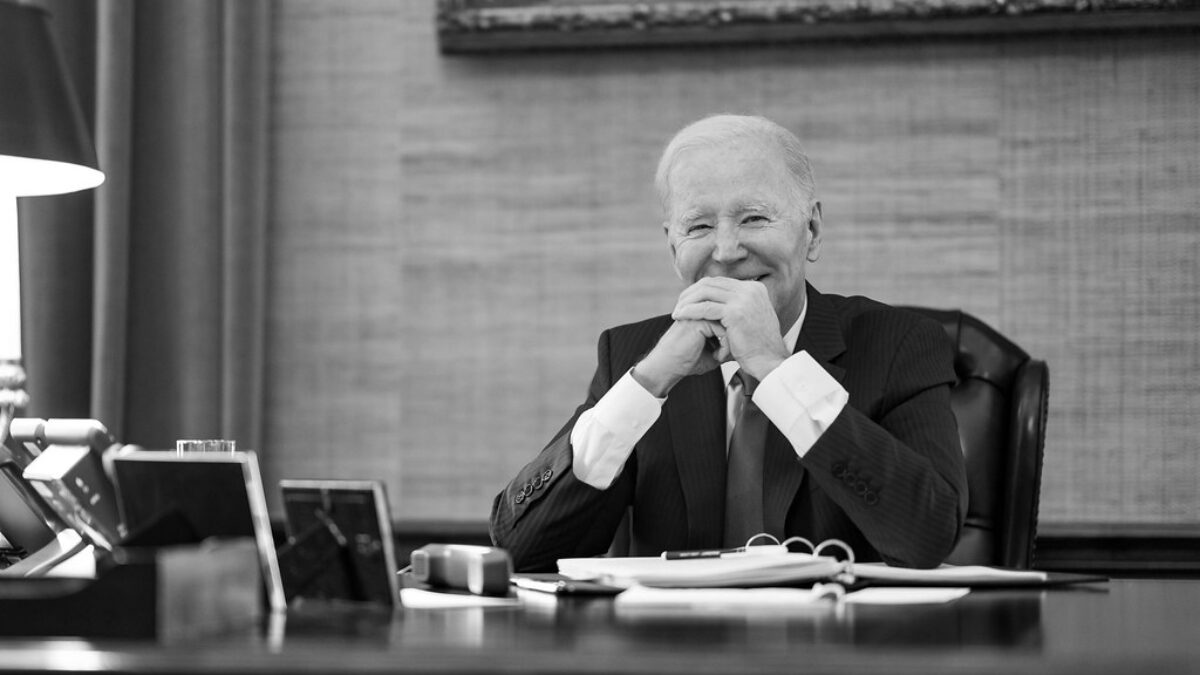
It’s all in the spin — or “lies, damned lies, and statistics” if you will.
During President Joe Biden’s Friday morning press conference, he made three risible claims in quick succession — doing what he could to deflect attention from a surprisingly anemic jobs report: 210,000 jobs added, less than half of the 550,000 expected in November.
1. Oil Companies Are Creating High Prices For Consumers
First, he claimed credit for the drop in wholesale oil prices through his “largest ever” release of oil from the Strategic Petroleum Reserve while encouraging India, Japan, United Kingdom, and even China to do the same — though he admitted that China hadn’t done so yet. This, he, said, caused oil and gas prices to drop, saying, “Since the end of October, the average weekly price of gasoline on the wholesale market has fallen around 10 percent.”
Of course, no word from the president on his administration’s war on domestic oil and gas, including canceling the Keystone XL pipeline, ramping up regulatory uncertainty by proposing an economically devastating methane rule. At the same time, he’s encouraging Russia’s Putin to produce more energy and giving the green light to Western Europe’s growing dependency on Russian natural gas via dropping efforts to prevent the completion of Putin’s Nordstream II gas pipeline under the Baltic.
He also failed to mention that one big reason oil prices could be declining is that the economy is stalling due to global fear of renewed (but ineffective) government lockdown efforts designed to make it look as if they’re doing something about new COVID-19 variants delta and omicron.
Continuing his discussion about oil, Biden claimed that retail gasoline prices haven’t fallen as much as they should. Retail prices typically lag declines in wholesale prices, so, he said, “I’ve asked the Federal Trade Commissions to consider whether potentially illegal and anticompetitive behavior in the oil and gas industry is causing higher prices for consumers when they don’t need to be that high because the wholesale prices have come down so much. So, we can assure to the American people are paying a fair price for gas.”
This deflection is from a well-worn political playbook. When politicians, and the bureaucrats they empower, take measures that make energy more expensive through things such as requiring special gasoline formulations, discouraging the construction of additional refinery capacity, preventing new oil production, carbon taxes, etc., it results in higher energy costs. That’s the point. That was the goal all along.
But higher energy costs are unpopular with the public, so, they must invent a boogeyman to deflect public attention from their own guilt in causing the higher prices. They do this by claiming the companies have engaged in collusion. The modern oil and gasoline refining and distribution industry is highly competitive. As a result, these investigations amount to no more than theater. When she was California’s Attorney General in 2016, Vice President Kamala Harris launched an investigation claiming oil producer price collusion while that state’s Gov. Gavin Newsom did so again in 2019.
2. The Supply Chains Are ‘Sped-Up,’ Stores Are ‘Well-Stocked’
Biden’s next whopper happened a minute later as he was talking up his administration’s efforts to fix the supply chain. “The shelves of our stores are going to be well-stocked,” he said.
“We’ve sped up operations at our ports,” he said. “For example, the ports of Los Angeles and Long Beach, the two busiest ports in America, over the last month the number of containers left sitting on the docks for over eight days is down by 40 percent… What does that mean? It means that the product are no longer sitting on the docks, they’re getting off the docks into trains, into trucks, into vehicles to get them to the store shelves. This is an incredible success story.”
He then added, “We’re heading into holiday season in strong shape. We averted this potential crisis by figuring out what needed to be fixed and then we brought together the people that had the capacity to fix it, or at least alleviate it.”
So, let’s go back to the main claim bolstered by data, that shipping containers “sitting on the docks for over eight days is down by 40 percent.” The number of containers not moving out of the heavily unionized, regulated, and notoriously non-automated ports of Los Angeles and Long Beach could drop because more are moving out — or the number could drop for other reasons.
On Dec. 1, it was reported that vessel wait times in Southern California are averaging 26 to 30 days compared to Houston at two to six days. But the smoking gun comes from a shipping industry publication which reported on Nov. 30 that “The Port of Los Angeles is forecasting import volumes in the week of Nov. 21-27 to drop 41.1%.” Why? Because “U.S. import volumes were at least temporarily easing as most pre-holiday cargoes have shipped and many Chinese factories were operating at about 60-70% capacity due to power and labor shortages.”
So, the 40 percent drop in containers sitting around was predicted and was due, not to the herculean effort of Transportation Secretary Pete Buttigieg but rather to a 41.1 percent drop in imports, caused, in part, to labor and energy shortages in China. Oops.
3. Build Back Better Will ‘Cut Costs’
Lastly, Biden claimed that his massive, proposed spending bill, the “Build Back Better” plan, would address the need “to cut costs further for families.” This would include lower costs for childcare. A family of four would see $7,400 in tax cuts and savings, he claimed. Biden said this would be done by asking corporations and wealthy Americans to “pay their fair share.” Which he defined as paying a minimum 15 percent tax that would, among other things, pay to provide universal preschool for all 3 and 4 year-olds. What’s better? Biden asked, lower taxes or a better-educated workforce in the future?
There are few, if any studies that account for socioeconomic factors that suggest that preschool bestows a lasting academic benefit. Rather, by third grade or so, there is no difference in math and reading scores between children who went to preschool compared to those who didn’t in American public schools.
So, why the push for universal preschool? Other than simply pouring federal money at an issue — resulting in a decline in private and religious preschools and a likely increase in the workforce — the Democrats get one massive benefit from boosting public education from 13 years to 15 years: a 15 percent increase in dues-paying members of teachers unions, worth hundreds of millions of dollars of additional election assistance at the federal, state, and local levels.









